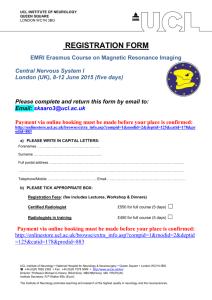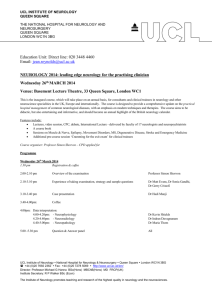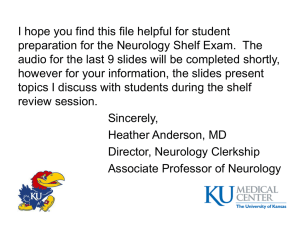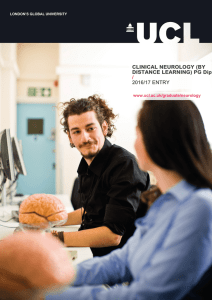TRANSLATIONAL NEUROLOGY MRes / 2016/17 ENTRY
advertisement
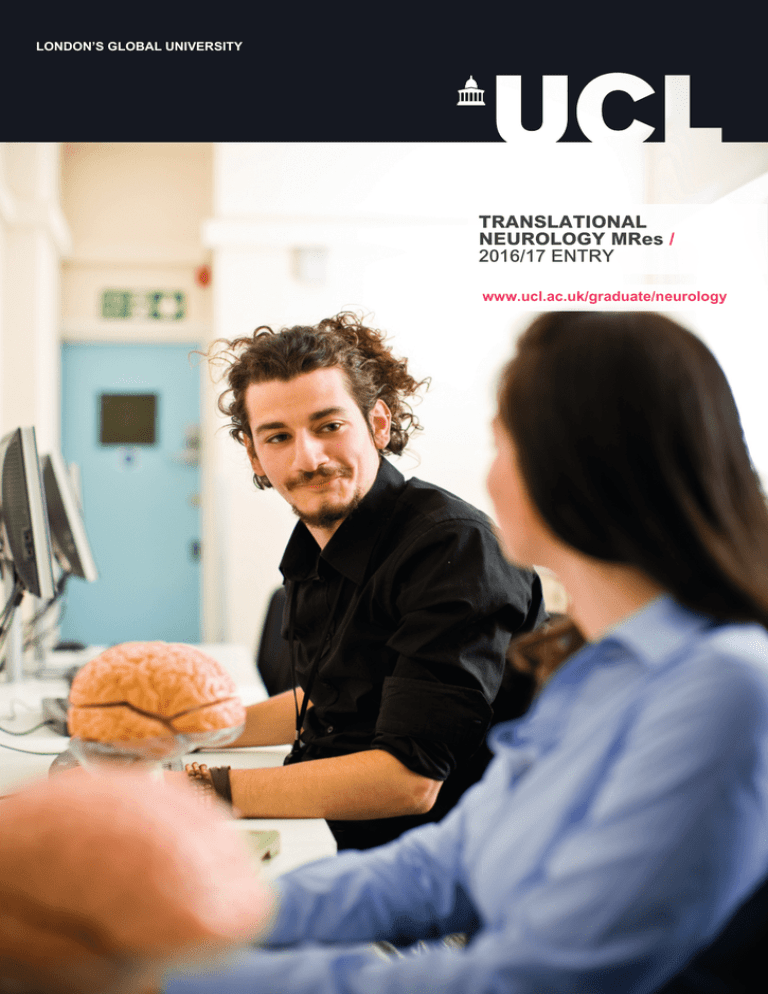
LONDON’S GLOBAL UNIVERSITY TRANSLATIONAL NEUROLOGY MRes / 2016/17 ENTRY www.ucl.ac.uk/graduate/neurology Translational Neurology MRes / This programme will provide a world-class education for advanced training in translational research, from preclinical discovery through to first-time-in-man studies in human and clinical trials in healthy volunteers and patients across neurology and neurodegeneration. Degree structure Mode: Full-time: 1 year Students undertake modules to the value of 180 credits. The programme consists of four core modules (60 credits), and a dissertation/report (120 credits). CORE MODULES Degree summary // Research in Practice // Translating Science into the Clinic The programme combines theoretical and practical teaching on both the breadth of, and complexity in conducting clinical research. Topics include clinical pharmacology, pharmacokinetics, research governance, medical statistics and the fundamental principle for using the correct enabling technologies within the context of medical research and drug development. // Experimental Neurology // Research Skills // The programme is delivered by the UCL Institute of Neurology, a specialist postgraduate institute and a worldwide centre of excellence in clinical research across neurological diseases, including movement disorders (e.g. Parkinson’s disease), multiple sclerosis, neuro-inflammation, epilepsy, stroke, cognitive dysfunction, Alzheimer’s Disease and other dementias. // Students will be taught by experts in the field and have the opportunity to network with internationally recognised opinion leaders in neurology and neurodegeneration. // By the end of the programme students will gain a thorough understanding of the challenges involved in setting up research projects, and learn how to design, implement, analyse and report clinical studies. Undertaking an extended piece of primary research in a clinical trials setting is particularly attractive to students wishing to pursue doctoral or clinical research. The focus on translational neurology, from within the specialist research setting of the Leonard Wolfson Experimental Neurology Centre, is also of note. The programme will combine lectures, workshops and tutorials. Practicals will focus on the role of surrogate markers and emerging technologies in drug development e.g. pre-clinical discovery, first time in man studies, and early phase clinical trials in healthy volunteers and patients. Assessment is through short answer unseen exams, coursework, simulated grant applications and written clinical abstract as well as a small component with a short answer exam. OPTIONS // There are no optional modules for this programme. DISSERTATION/REPORT // Students will have the opportunity to work with internationally recognised researchers from the UCL Institute of Neurology, and the Leonard Wolfson Experimental Neurology Centre as they undertake their research projects, which culminates in a dissertation of 15,000 words. Your career The programme is designed to cater to graduates in medicine and biomedical sciences who wish to gain valuable training in clinical research before embarking on a clinical PhD programme, medical training, or professional work in clinical trials. The successful completion of the MRes should also enhance opportunities for graduates to enter medical school or for MBBS graduates to progress to specialist medical training. Employability Whatever your chosen career pathway, the MRes in Translational Neurology will equip graduates to either get a first step on the ladder, change career directions or help to become more experienced with a specific expertise in your chosen career. Entry requirements A medical degree (MBBS) or a minimum of an upper second-class UK Bachelor’s degree in life or biomedical sciences (for example, neuroscience, pharmacology or chemistry) or an overseas qualification of an equivalent standard. English language proficiency level If your education has not been conducted in the English language, you will be expected to demonstrate evidence of an adequate level of English proficiency. The level of English language proficiency for this programme is: Standard. Information about the evidence required, acceptable qualifications and test providers is provided at: www.ucl.ac.uk/graduate/english-requirements FEES AND FUNDING // UK & EU (2016/17) entry: £10,130 (FT) // Overseas (2016/17) entry: £24,400 (FT) Two £2,000 bursaries are available to Home/EU students (awarded on academic merit based on applications/references provided). All accepted students will automatically be considered for the award. The programme director will make the final decision soon after the application closing date. Full details of funding opportunities can be found on the UCL Scholarships website: www.ucl.ac.uk/scholarships APPLICATION DATE All applicants: 29 July 2016 CONTACT Your application The deadline for all applicants is 29 July 2016. Students are advised to apply as early as possible due to competition for places. Those applying for scholarship funding (particularly overseas applicants) should take note of application deadlines. When we assess your application we would like to learn: // // // // why you want to study Translational Neurology at graduate level // where you would like to go professionally with your degree why you want to study Translational Neurology at UCL what particularly attracts you to the chosen programme how your personal, academic and professional background meets the demands of this challenging programme Together with essential academic requirements, the personal statement is your opportunity to illustrate whether your reasons for applying to this programme match what the programme will deliver. Applicants who have a portfolio are strongly recommended to submit it when they apply. Details on how to apply are available on the website at: www.ucl.ac.uk/graduate/apply PDF Updated: May 25, 2016 Information correct at time of going to press. See website (www.ucl.ac.uk/ion) for latest information Email: ion.educationunit@ucl.ac.uk Telephone: +44 (0)20 3448 4740
